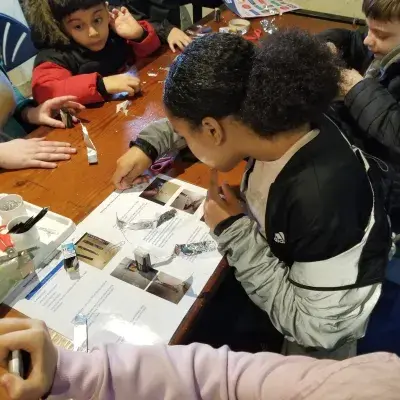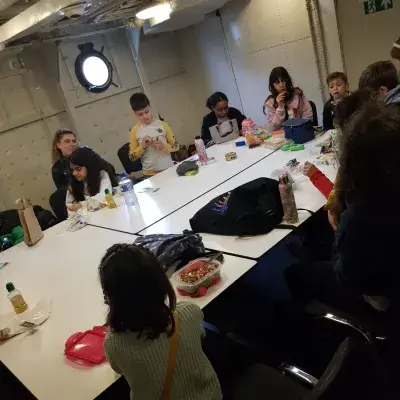Navigating HMS Belfast: Conquering Sensory Overload
During half term the Imperial War Museum invited us to spend a day unleashing our inner explorers on the HMS Belfast. Our group consisted of both teenagers and families. Not only did we have a great visit, but it also provided an opportunity for teenagers to learn to regulate themselves in a sensory overload environment. For families, it was a chance to reduce isolation.
A floating City: the HMS Belfast experience

HMS Belfast is a huge warship that was originally built for the Royal Navy. Constructed in 1936 and commissioned in 1939, she once had a 950-strong crew and played an important part in the Second World War. She is now permanently moored as a museum ship on the river Thames, making her an iconic London landmark.
During our visit, we were able to explore the ship’s nine decks and immerse ourselves in the ship’s rich history. There was so much to see, it felt like a floating city.
With nearly a thousand sailors to feed, HMS Belfast produced, with the help of 26 cooks, food on an industrial scale. We visited the potato store where ingredients were stored, and the bakery where fresh bread was baked every day. As well as being well fed, the crew also had to be fighting fit in order to perform their duties well. We took a tour of the ship’s sophisticated medical centre that included a sick bay, dental surgery, dispensary and examination room.
We were also provided with our own private room to chill, create and craft. We made cookies and our own Morse Code transmitters! Morse Code is a type of code used to send messages via sound or visual signals. Each letter in the alphabet is represented by a different sequence of long and short sound or visual signals called dots and dashes. It was widely used during the Second World War by Britain’s armed forces when communication wasn’t as easy as it is now.
An Opportunity for Regulation and Connection

This visit provided us with various benefits for both teenagers and families.
For many teenagers, the boat felt too smelly, noisy, and confusing due to the number of decks, creating a high level of sensory overload. We had to learn to accept each other as we are and understand that sensory overload can cause massive dysregulation for some people. We explored how to understand and express what we feel in our bodies in order to find the best route to re-regulate. We also explored regulation techniques with some of the teenagers, such as breathing exercises, taking time out, and using fidget toys.
For families this outing offered numerous advantages, as highlighted by a mother's testimonial: "It is so nice to be in a group and do some outings with others. I don't feel as isolated and lonely. Please organize more of this."
These group activities provide essential social support, reducing feelings of isolation and loneliness. They create a sense of community and understanding among parents facing similar challenges, fostering shared experiences and mutual encouragement. Additionally, children benefit from social interaction in a supportive environment, promoting their social and emotional development. Those group outings can significantly enhance the well-being of both parents and neurodiverse children.
In Conclusion: We learnt a lot, had fun connecting as a group and everyone felt welcome. Thanks again to our friends at the Imperial War Museum for a great day out!
We will organise more outings, so keep an eye out! Check out our "Family Connect" group on Sunday afternoon, and join us for Parent "Coffee Connect" this Friday 7 June at 56 Southwark Bridge Road, SE1 0AS, from 8:30 AM to 10:30 AM
